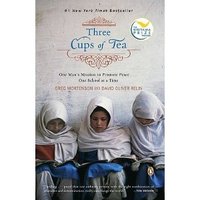It’s easy to understand why Three Cups of Tea has been on the bestseller list for years, and even easier
to understand why schools assign it as summer reading. It would be simple to
start a discussion with the question: What did you learn from reading it?
And I could imagine someone saying they learned about the
history and culture of Pakistan and Afghanistan. Or another that they learned
about the way education can make a greater difference in the stability of a
nation than any other investment. Or another that they learned how much
Americans have in common with people in the middle East, with Muslims, with
people who have been called our enemies in recent years. And I could imagine
someone saying that they learned that individuals, with vision and passion and
courage, can change the world.
Three Cups of Tea
is the true story of Greg Mortenson, son of missionary parents, mountain
climber, and founder of the Central Asia Institute, an organization devoted to
promoting peace throughout the regions of Pakistan and Afghanistan, mostly by
equipping locals to build schools. This story begins in the 1990’s before
Pakistan and Afghanistan made daily news in the United States. After failing to
summit K2, Greg Mortenson made a promise to build a school (for $12,000) in a
village in Pakistan. He kept his promise. And as the years went on, he found
his calling. This calling–to support and provide for schools throughout the
region–coincided with 9/11 and the subsequent war against the Taliban in
Afghanistan.
I’m afraid I can’t do justice to the impact of this story–to
the compelling portrait of a people who long to be educated and the evidence
that education will provide sustained change and bring with it peace. Mortenson
and Relin, co-authors, relate a story of students sitting outside, tracing
multiplication problems in the dirt, with no teacher, because they so want to
learn. Or the story of a young boy sent away to get an education. In order to
get to the city, the young boy had to ford a river. His father “inflated six
goat bladders and lashed them together into a zaks, or raft… ‘Now hold on tight,’ he said. His son couldn’t
swim.” Greg Mortenson goes to comparable lengths to see to it that these
children receive an education without having to endure these types of hardship.
I’m equally afraid I can’t do justice to the tenacity of
Greg Mortenson. To the sacrifices he and his family have made as he travels
across the globe and risks his life on behalf of these children and families he
loves, as he works for a minimal salary. To the love he develops for the people
of these foreign lands, love for their customs, love for their patience, love
that crosses religious barriers and becomes friendship.
I highly recommend Three
Cups of Tea. It weaves together a history of American-Pakistan-Afghanistan
relations for the past two decades. It argues for education and economic
development rather than force. And it tells a story of the way reciprocal
relationships of mutual trust and respect can change the world.


